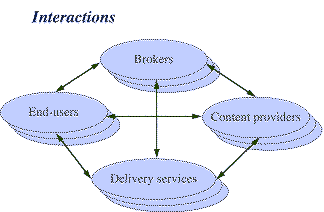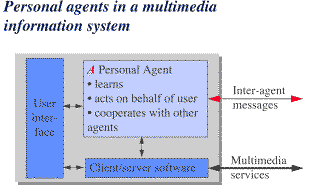Application proposal: Agents in an open distributed information system
Paul Kearney
Research Manager, Distributed Intelligent Systems
paul.kearney@sharp.co.uk
Sharp Laboratories of Europe Ltd.
Oxford Science Park
Oxford OX4 4GA
Caveat
This is a personal position statement and the views expressed herein do
not necessarily reflect those of Sharp Laboratories of Europe Ltd. or
of Sharp Corporation.
Summary of proposal
The proposal is that FIPA should define the syntax and semantics of
an inter-agent message language to be used to implement an an extra layer of
"" control to augment existing and projected multimedia
content delivery services working over public networks.
The language would be used to
exchange information on the availability of services and content, negotiate
over terms and conditions, etc., then when agreement is reached, authorise
delivery. The requirement is general across all classes of distributed
information system. However, for the sake of concreteness I concentrate on
Internet applications using HTTP.
Application overview

The field of open distributed information systems (I use a broad definition of
information which includes entertainment and communication) is an extremely
important application area for agent technology. Greater intelligence and
autonomy is required in
- client software, where the agent acts on behalf of the
user of the information,
- in server software, where the agent acts on behalf of the ""
of the information
- in software managing the services which link the two (including
communication services, broking services and services consolidating and
converting information).
Note that the distinctions among the above is somewhat artificial. For
example the same software may act in the role of client one minute and
server the next.
Already we are seeing agent products on the market (at least the
vendors claim they are agent-based). These tend to be:
- client-based, i.e. they add functionality to the client software, and
make use of client interface to content delivery services
- server-based, i.e. they add functionality to the server / broker
software, and
make use of server interface to content delivery services
- hybrid, i.e. they have both client-based and server-based components
communicating via a special-purpose protocol, frequently layered on
top of the client-server protocol of the delivery service.
There are many advantages to having distinct client- and server-based
components which cooperate with each other (as in the hybrid approach).
However, for agents to achieve their full potential, the cooperation
needs to be multi-way (not just 1-to-1), and the agent-agent communication
needs to be open to allow interoperability and free competition. There
are also limits to what can be achieved by using the delivery service
protocol for agent-agent communication.

My view is that agents will be used to provide an extra layer of
"" control to augment existing and projected multimedia
content delivery services working over public networks. The agents will
exchange information on the availability of services and content, negotiate
over terms and conditions, etc., then when agreement is reached, authorise
delivery. Examples of delivery services include:
- Internet/HTTP (World-Wide Web)
- interactive digital broadcast, VOD, etc.
- telephony-related services
In the following discussion I concentrate on Internet/HTTP, because
it is (probably) the most rapidly emerging requirement and for reasons of
concreteness. I also assume that agents are static and inter-agent
communication is by
message-passing. Analogous issues do also arise in the case of
mobile agents, however. Perhaps
FIPA should aim to support both in an integrated fashion.
Application to World-Wide Web
The World-Wide Web client-server protocol is the HyperText Transfer Protocol
or HTTP. A client sends a server a request in which the object of the request
is specified by a URL (uniform resource locator). The object of the request is
usually a file, which the server transmits back to the client. However, it
is also posible for the request to be processed by a script or by an agent
which generates document on the fly. Note that HTTP
provides for a series of parameters and values to be passed as part of the
URL. This is how communication with search engines work, for example -- the
search terms are passed as parameters within the URL, and the search engine
generates (typically) an HTML document containing references to known
documents. Search queries are normally initiated by the user, who also
views the response and decides on further action him/herself. However it
is also possible for a client-side agent to initiate the search and to
analyse the response and take appropriate action itself. Thus HTTP itself
can be (and is) used for agent-agent communication / cooperation.
However, there are a number of problems with this approach including:
- expressiveness is severely limited
- semantics are defined only for a specific application (e.g. a specific
search engine)
- the connection-oriented HTTP is not well suited to passing many small
messages -- one probably wants to perform agent-agent negotiation to identify
with a high degree of confidence the sought information and agree terms before
opening up the expensive connection to preform the document transfer.
There is, therefore, a strong case for an agent-agent message language to
augment HTTP.
The message language will not only allow improved versions of existing
classes of WWW service, however. It will also enable a wide variety of
novel intermediate ("") services, support cooperation within user
groups, and facilitate commercial transactions. There is also the possibility
of negotiation between information agents and agents within the Internet
infrasctructure concerning quality of service parameters, charges, etc.
Standardisation items
Interface to message delivery service
It is not appropriate for FIPA to consider the mechanisms for delivering
inter-agent messages. However, FIPA should define desired characteristics
and an API covering sending and receipt of messages.
Characteristics to be considered include:
- connectionless, store-and-forward, address by user/agent name
- security & authentication
- guaranteed delivery?
Syntax and semantics
The various levels of language requiring
definition include:
- Outer layer / speech act level (cf KQML) -- relatively easy to specify
syntax, but must be clear on semantics of speech acts, etc.
- grammar level (cf KIF) -- several candidate styles (e.g. 1st order logic).
It may be necessary to keep the grammar simple (at least initially) or to
have graduated levels of capability.
- domain ontology -- a vocabulary which grounds the language in the
real world. It must describe document content, servers and the services they
supply, user and client characteristics, terms and conditions (cost, quality of
service ...), agents and their capabilities, etc. It needs to be expandable,
which means agents must be able
to compare versions (so the ontology must be able to describe itself to some
extent. Even in this restricted
application area it may be necessary to define sub-ontologies (for example, all
agents understand a basic ontology, plus zero or more sub-ontologies)
- negotiation protocols -- a number of dialog structures (perhaps expressed
in terms of state machines) describing message-exchange sequences reaching
definite conclusions. Example "" include:
- agreeing terms and conditions for supply of a service (e.g. transfer of
a document)
- agreeing a level of language complexity and a common set of sub-ontologies
so that a meaningful dialog can take place.
- an incrementally refined search for a service satisfying the client
agent's requirements (e.g. search for the best document containing specific
information)
My view is that we should aim to define a simple, practical, but extandable
language rather than a complex one which aims to solve all problems in one
go.
Related issues
Related issues to be born in mind include:
- standardisation of interfaces between agents and standard client and
server software (e.g. web browsers, web servers, databases)
- payment for commercial transactions
- mobile agents / executable messages


